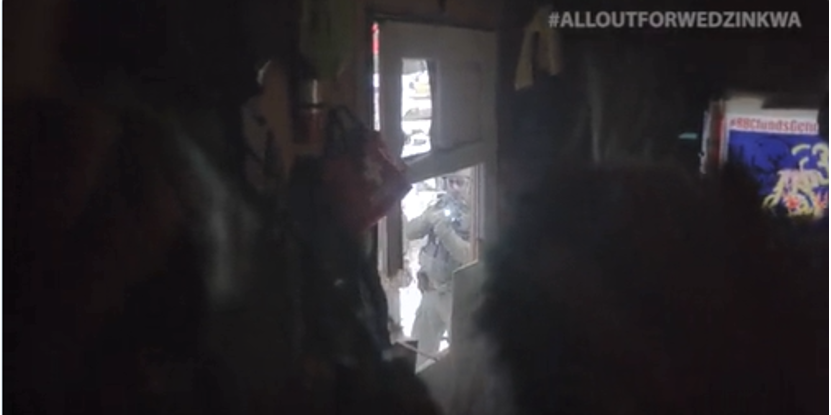The LNG Canada mega-project (including a liquefied natural gas export terminal supplied by a fracked gas pipeline) was conceived in 2011 with the formation of a joint venture between Shell, Mitsubishi, PetroChina and Korea Gas Corporation.
The Coastal GasLink project formally emerged in June 2012 when TransCanada (later rebranded as TC Energy) was selected by LNG Canada to design, build, own and operate the pipeline system that would feed the export terminal with fracked gas.
Wet’suwet’en opposition to any and all pipelines on their territory was evident from the early stages of this mega-project.
That opposition was quickly criminalized.
By January 24, 2014, the RCMP’s Critical Infrastructure Intelligence Team (CIIT) had produced an intelligence assessment on Criminal Threats to the Canadian Petroleum Industry that notes “violent aboriginal extremists” and includes in Appendix E an article from the Georgia Straight that briefly mentions the Unist’ot’en clan of the Wet’suwet’en nation.
A further document dated April 1, 2015, from the Government Operations Centre (GOC), which compiles information from the RCMP and other agencies, describes an unnamed Unist’ot’en leader as an “aboriginal extremist.”
Within five years of that second report, the RCMP had launched two militarized raids against the Wet’suwet’en.
The Guardian later reported that notes from a strategy session for the first heavily-armed raid showed that RCMP commanders argued that “lethal overwatch is req’d” – a term for deploying an officer who is prepared to use lethal force.
This despite RCMP documents indicating there was “no single threat indicating that [land defenders] will use firearms”.
Furthermore, The Guardian noted: “The documents also show close collaboration between the RCMP and TC Energy: police officers attended company planning sessions and daily ‘tailgate’ meetings, and were privy to CGL’s legal strategy.”
A third raid on November 18-19 resulted in the arrests of about 30 people, including Gidimt’en land defenders.
There are first-hand accounts of the RCMP in CGL cars on the territory; white school buses of the same make used to transport RCMP officers from the Smithers airport to conduct the raids against land defenders later emerging from one of the CGL man camps on the territory; and, RCMP officers arriving in CGL marked buses in the nearby town of New Hazelton to break-up a Gitxsan rail blockade in solidarity with the Wet’suwet’en.
Numerous concerns emerge from these reports.
These include the misrepresentation by the RCMP of Wet’suwet’en land defenders upholding their territorial rights as “extremist” and “violent.”
This concern is further compounded by the Canadian government’s financial involvement in this mega-project, notably its $275 million investment in June 2019 supporting the LNG Canada export terminal along with Export Development Canada’s $250 million to $500 million loan to Coastal GasLink in May 2020 for the construction of the pipeline.
The nexus of state investment (that could total $775 million) and state violence (backed by about $20 million in public funds) also leads to questions about the state’s commitment to adhere to the Supreme Court of Canada ruling (which recognized Wet’suwet’en title and rights to the land) and international human rights conventions, notably the International Convention on the Elimination of All Forms of Racial Discrimination.
The Committee on the Elimination of Racial Discrimination, the expert committee that monitors state compliance with the Convention, called on Canada in December 2019 (after the first RCMP raid and just weeks prior to the second raid) to stop construction on the Coastal GasLink pipeline and withdraw the RCMP from Wet’suwet’en territory.
The Committee then expressed disappointment with Canada’s inadequate response to its decision, and, just days before the third RCMP raid, Canada missed the deadline to submit its periodic review on its compliance with the Convention it ratified in 1970.
The breaches of Wet’suwet’en and Canadian law, the criminalization of land defenders upholding their inherent and recognized rights, state violence and the appearance of collusion between the police and an energy company, along with the disregard of international human rights norms raise profound concerns that must be addressed.
Brent Patterson is a rabble contributor and the executive director of Peace Brigades International-Canada. He travelled to Wet’suwet’en territory last week to observe, accompany and report on the Wet’suwet’en resistance to the Coastal GasLink pipeline.



